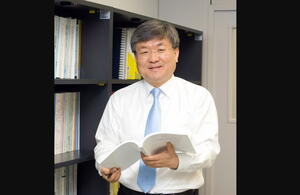The Navigator
Gyung-Su Lee or GS, as everybody calls him, is a tough negotiator. Those who have worked side-by-side with him remember scenes for example from the ITER Design Review in 2007, in which he argued with body and soul to convince the panel members to follow his advice. And as they hesitated, his emotions almost forced him to leave the room. What a great actor, you might have thought, this man knows how to play the cards well. But then one sentence makes you reconsider and explains perhaps what drives him: "Fusion is my life, I don't want it to fail."
Fusion has indeed played a big role in the life of GS Lee. He studied physics at the Seoul National University in Korea before continuing at the University of Texas at Austin in the USA. His Ph. D. thesis on plasma turbulences in tokamaks was written under the guidance of the "Pope of Plasma" Marshall Rosenbluth and Pat Diamond. GS went on to work as a member of the research staff at Oak Ridge and then at MIT, before returning to Korea to take up the post of Director of the Joint Research Division of the Korea Basic Science Institute. From 1996-2005 he was the Principal Investigator of the prestigious KSTAR project and became the Director-General of ITER Korea in 2007 (see link)—a post he handed over to Kijung Jung when he became President of the National Fusion Research Institute of Korea in September 2008. He is also the current Chairman of the International Fusion Research Council of the IAEA.
More recently, GS took over as Chair of the ITER Management Advisory Committee (MAC), one of the two subcommittees of the ITER Council, the Project's governing board.
Looking at his impressive credentials, it becomes evident that GS has devoted a major part of his life to developing fusion as a future energy source. He believes in fusion, without a doubt, but there is more to add. GS is also a passionate Christian who devotes his Sundays to worship in his hometown Daejeon. And it stems from this religiousness when he says that "time should not be wasted." That, he adds, holds in many respects—also for ITER.
"Yes, we could have done better," admits Lee. "I guess that all of us are unsatisfied at times with the slow progress and I can understand that people watching us are cautious. But now that we have agreement on the table for the project's schedule there is light at the end of the tunnel. Without a finalized Baseline we were adrift. But now we will be able to benchmark our targets: What do we want to build, when do we want to finish and what resources do we need? We are not yet there, but at least we know where we are going. And that is a big success."
With 20 years of experience as project manager, GS knows that the "human factor" is crucial for any project. "Managing people doesn't work by dictating what to think or do," he says. "It only works through belief and trust. You have to make people believe in what they are doing. For ITER, that means that you have to make the scientists understand that ITER—at the moment—is a construction project and that you can't do both at the same time: build and do continuous improvement by doing research. I know what I am talking about as I have worked on both sides."
He compares his role as Chairman of the MAC to being a navigator. "In a big international project like ITER each party has its legitimate concerns and differing opinions. This is very normal. The challenge here is to come up with a decision that is supported by all through faith and trust. Just compromise would not work," says Lee.


